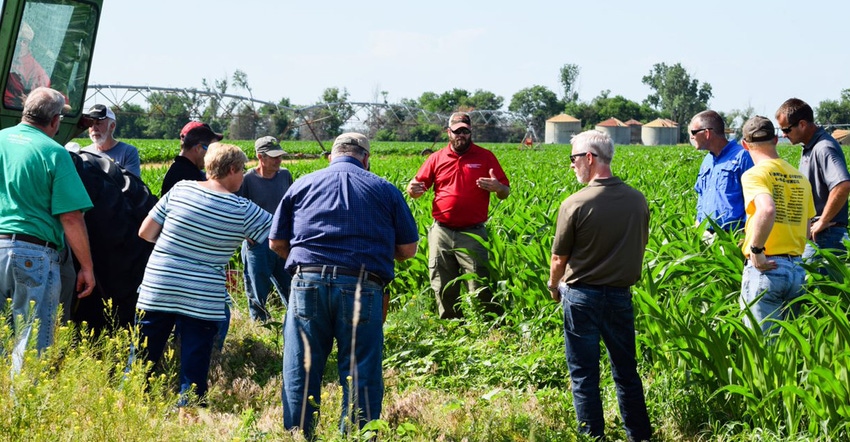June 26, 2019

Throughout time, living organisms have evolved and developed ways to survive in their environments. This is a natural reaction for species survival if a new element is added to an environment that can cause death and destruction of a species.
It is therefore not a shocking statement that in agriculture pests have been able to develop levels of resistance to elements introduced into their environments to eliminate them. The only difference is that instead of these being natural elements of destruction, these are human interventions. Whatever the introduction, the result is the same: Pests will eventually adapt and survive.
In agriculture, many tools have been used in an attempt to eliminate pests within crop fields, but one pest has eluded destruction greater than all others: weeds.
Regardless of what a farmer may attempt for control, environmental conditions that exist or the species cultivated for production, there will always be a plant in a field that is out of place and can be called a weed.
With this in mind, the state of Iowa is pursuing a different approach to combatting the problem of weed and pest resistance development.
Team approach to managing pests
The Iowa Pest Resistance Management Program (IPRMP) is an Iowa-specific effort to address pests — weeds, insects and diseases — that can adapt and become resistant to chemical, genetic and agronomic control practices on a local level.
It outlines approaches for effective, integrated management solutions that will sustainably control pests. The program differentiates itself from others by helping to form community teams of farmers, agronomists, crop advisers, researchers, bankers, agribusiness professionals and landowners to increase collaboration, spread awareness and find solutions to local resistance issues.
Many programs take a broad-based approach to problem solving on an individual farmer level. This can be effective but is inherently not sustainable unless everyone in the community is involved and are good stewards.
Forming smaller, community-based groups and to find solutions is a more sustainable practice so farmers can see real results in their own backyard and help each other with the problems.
1 of 4 IPRMP projects in Iowa
The Harrison County Herbicide Resistance project is one of several community-led resistance management projects implemented across the state as part IPRMP.
Within Harrison County in western Iowa, herbicide-resistant weeds were identified by local farmers and agronomists.
A group of individuals from Iowa Corn Growers Association, Agriland FS, BASF, Asgrow/Dekalb, Heartland Co-op, FCSA Financial, Midstates Bank, USDA Farm Service Agency, Iowa Farm Bureau, Iowa State University and local farmers has come together based on these observations and decided to combat this problem with a team and community effort instead of an individualistic approach.
This team effort has led to confirmation of weed and pest resistance issues across the county, and educational events for all farmers are being held so they can learn about issues in their own backyard.
Local weed resistance issues
In Harrison County, seeds of three major weeds — waterhemp, giant ragweed and Palmer amaranth — were collected, grown in ISU greenhouses and screened for resistance to some commonly used herbicides.
A fourth weed also was collected, marestail, but those seeds did not germinate in the tests. All three demonstrated resistance to Roundup (glyphosate, Group 9). The waterhemp also showed resistance to Cobra (lactofen, Group 14).
Palmer amaranth and giant ragweed also displayed resistance to Callisto (Mesotrione, Group 27).
These results are not unique to Harrison County or Iowa, as these are known resistances. However, these results show that resistance is not something used as a buzz word, only seen on the internet, or mythical possibilities heard about at meetings. These real-life local results create a concern for current and future management of waterhemp, giant ragweed and Palmer amaranth.
A sense of community and pride help set the ag community and Iowans apart from many others in this world. The future of weed and other pesticide resistance management may require communities to work as one to row the boat instead of many individuals in their own canoes.
For more information on IPRMP, go online to protectiowacrops.org.
Witt is an ISU Extension field agronomist covering west central Iowa. Contact him at [email protected].
Sharing knowledge in Harrison Co.
To help educate farmers in combating weed resistance issues, the Harrison County Herbicide Resistance Project will hold a field day from 10 a.m. to 1 p.m. July 9, northeast of the intersection of Niagara Trail and 262nd Street, about 1.5 to 2 miles southwest of downtown Logan.
In case of rain, the event will be held at the Logan Community Center, 108 W. Fourth St. in Logan. The Iowa Cattlemen’s Association will offer a grilled lunch. Call the Harrison County Extension office at 712-644-2105 for details.
This field day will allow discussion and observation of a soybean field trial, which includes over 15 different combinations, both herbicide and tillage practices, and more. Soybean frogeye leaf spot fungicide trials will also be on-site and discussed.
These practices do not cover all the possibilities of resistance management in Harrison County but do address common areas of farmer possibilities to open the community dialogue.
About the Author(s)
You May Also Like






